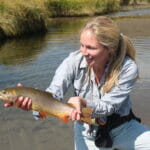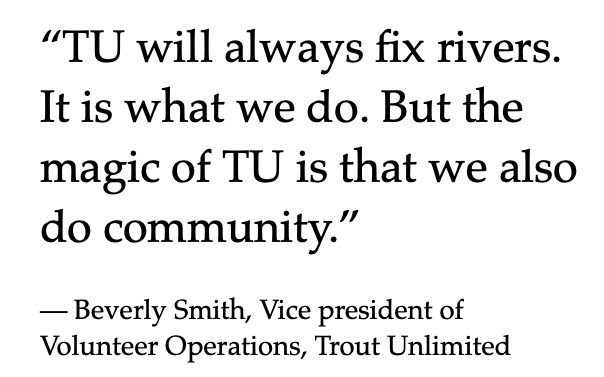“Why doesn’t TU stick to fixing rivers?”
I’ve been asked this question more than a few times this week, this year—really, numerous times over my past 12 years on staff at Trout Unlimited.
Generally, I pick up the phone and talk with folks. TU is a place where relationships are deep, and that sort of one-on-one, healthy dialogue is the norm. While I still welcome those individual conversations, this week I’m compelled to amplify our answers, our questions, our dialogue, our values.
TU will always fix rivers. It is what we do. But the magic of TU is that we also do community.
We need people—all people—to achieve TU’s mission. That recognition is why 400 TU chapters have engaged in youth education for 60 years. It’s why for decades we’ve invested in teaching students in places like New York City about their local watersheds and the importance of conservation of those resources through the lens of trout.
It’s why over 200 chapters are actively engaged in outreach to veterans and their families.
It’s why when it came time to stand up for places like Bristol Bay and countless other advocacy campaigns, we knew it would be meaningless to do so without real partnership with the local tribes.
And a dozen years ago, recognizing that we need all people to participate in our conservation work, TU’s National Leadership Council launched a highly successful Women’s Initiative. That has since evolved into our Diversity and Inclusion Workgroup and our correlating Equity Practice.
While our impact has been meaningful, in order to fully realize the unencumbered participation of all people, it is critical to first acknowledge that deep-rooted histories of injustice affect the lives of millions of people of color every day. Our black and brown neighbors, friends and colleagues continue to live in fear of the very systems that are supposed to ensure safety and justice. People of color have been systematically excluded from the conservation movement and experience a disproportionate level of impacts when our watersheds and environments are unhealthy. Access to fishing and public lands are inequitable too, as Christian Cooper showed us last week birding in Central Park.
I must—we must—do more to fully carry the burden of combating racism using my voice, but also with everyday actions.
I was asked what it meant to me to post the black square on social media this Tuesday. In essence, I believe that to be silent is to be complicit. Yet, Tuesday with some irony, I was silent, posting only a black square and the hashtag #blackouttuesday. Millions of people did the same, standing in solidarity on social media to symbolically support the Black Lives Matter movement, stand-up against anti-blackness sentiments, and to reflect on the senseless murders of George Floyd, Ahmaud Arbery, Breonna Taylor, and others before them.
It was also an intentional silence in order to amplify black voices. Amplifying these voices means making space, and sometimes silence is the best way to do that. At other times it’s lending my white-identified voice to the mix in solidarity, as I am hoping to do today. Amplifying the voices of people of color, however that is done, is something that will not just happen on Tuesdays.
I’m proud to have shared my black square, but make no mistake, I don’t confuse it for action.
Over the past year, TU has done significant work deepening and growing what we refer to as our equity practice. The word “practice” is intentional, and meant as a noun and verb. The verb tense resonates particularly with me: to perform an activity or exercise (a skill) repeatedly or regularly in order to improve one’s proficiency. It conveys for me that if I commit to working on combating anti-black actions and promoting anti-racist activities daily, I will get better. I will goof and get it wrong— I’ve probably even done so here—but I have to try. When we practice fly casting, we get better. When we practice equity we will get better too, and we can make change.
When I was asked to co-lead TU’s equity practice, or at that time our “DEI Planning Process,” I started in with some divide-and-conquer tactics and a task-list operating on a tight timeline.
“We’ll sub-committee this, sub-committee that, come back together, and we’ll have done it.”
Gratefully, I was called out by someone I deeply respect for this approach, and I was asked to slow way down.
For me, that was an adjustment. I am deeply motivated by a sense of urgency around TU’s mission and around racial justice. That sense of urgency has served me well in other facets of my life, but it has resulted in a fast-talking, fast-acting Beverly. I like to check things from my list and move on to the next issue. But this isn’t an issue. This is hundreds of years of oppression that I have been complicit in perpetuating. I wasn’t going to get to that place of understanding and share it with others via a sub-committee meeting or check-list.
For me, this work has included a lot of listening, learning, introspection, painful self-discovery, forgiveness, acceptance, healing, kindness, empathy and compassion.
Over the last year, dozens of TU staff, volunteers and trustees have come together to engage in this equity practice at both the personal and organizational level. We’ve been guided by some of the best in the business and some of the best minds among our staff and volunteer ranks. We’ve put into place meaningful changes within our organization, from internal HR policies to marketing/communications practices and much more. However, our efforts are still nascent. We have much to do, but we are committed to constructive action.
We know, now more than ever, that our collective resilience means serving, engaging, listening and lifting up the voices of every single member of our communities equally and equitably.
Please know we’re practicing, and we will get better. Listening and learning is the first step, and we invite you to learn more along with us and join us in this journey at tu.org/equity.
In solidarity,
Beverly
Beverly Smith is TU’s Vice President for Volunteer Operations.



